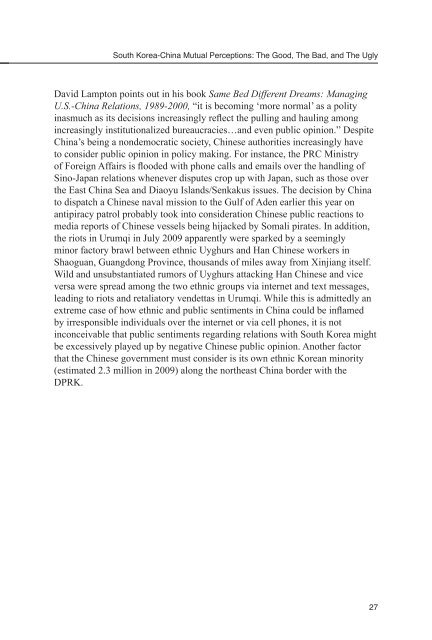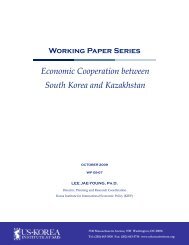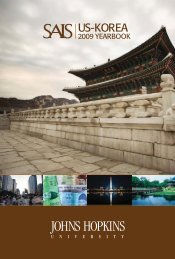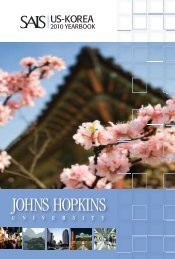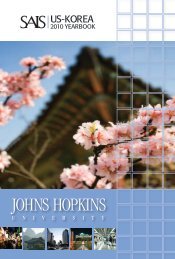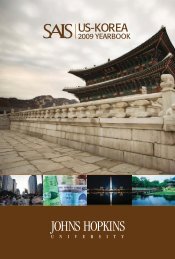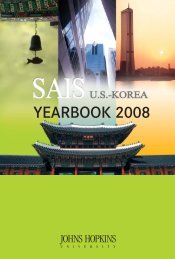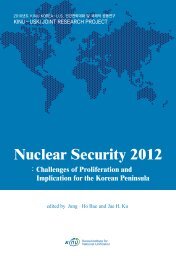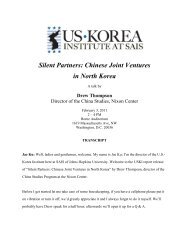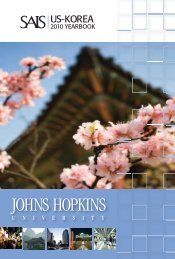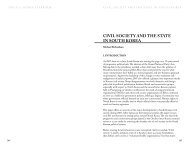US-Korea Institute at SAIS
US-Korea Institute at SAIS
US-Korea Institute at SAIS
- No tags were found...
Create successful ePaper yourself
Turn your PDF publications into a flip-book with our unique Google optimized e-Paper software.
South <strong>Korea</strong>-China Mutual Perceptions: The Good, The Bad, and The Ugly<br />
David Lampton points out in his book Same Bed Different Dreams: Managing<br />
U.S.-China Rel<strong>at</strong>ions, 1989-2000, “it is becoming ‘more normal’ as a polity<br />
inasmuch as its decisions increasingly reflect the pulling and hauling among<br />
increasingly institutionalized bureaucracies…and even public opinion.” Despite<br />
China’s being a nondemocr<strong>at</strong>ic society, Chinese authorities increasingly have<br />
to consider public opinion in policy making. For instance, the PRC Ministry<br />
of Foreign Affairs is flooded with phone calls and emails over the handling of<br />
Sino-Japan rel<strong>at</strong>ions whenever disputes crop up with Japan, such as those over<br />
the East China Sea and Diaoyu Islands/Senkakus issues. The decision by China<br />
to disp<strong>at</strong>ch a Chinese naval mission to the Gulf of Aden earlier this year on<br />
antipiracy p<strong>at</strong>rol probably took into consider<strong>at</strong>ion Chinese public reactions to<br />
media reports of Chinese vessels being hijacked by Somali pir<strong>at</strong>es. In addition,<br />
the riots in Urumqi in July 2009 apparently were sparked by a seemingly<br />
minor factory brawl between ethnic Uyghurs and Han Chinese workers in<br />
Shaoguan, Guangdong Province, thousands of miles away from Xinjiang itself.<br />
Wild and unsubstanti<strong>at</strong>ed rumors of Uyghurs <strong>at</strong>tacking Han Chinese and vice<br />
versa were spread among the two ethnic groups via internet and text messages,<br />
leading to riots and retali<strong>at</strong>ory vendettas in Urumqi. While this is admittedly an<br />
extreme case of how ethnic and public sentiments in China could be inflamed<br />
by irresponsible individuals over the internet or via cell phones, it is not<br />
inconceivable th<strong>at</strong> public sentiments regarding rel<strong>at</strong>ions with South <strong>Korea</strong> might<br />
be excessively played up by neg<strong>at</strong>ive Chinese public opinion. Another factor<br />
th<strong>at</strong> the Chinese government must consider is its own ethnic <strong>Korea</strong>n minority<br />
(estim<strong>at</strong>ed 2.3 million in 2009) along the northeast China border with the<br />
DPRK.<br />
27


